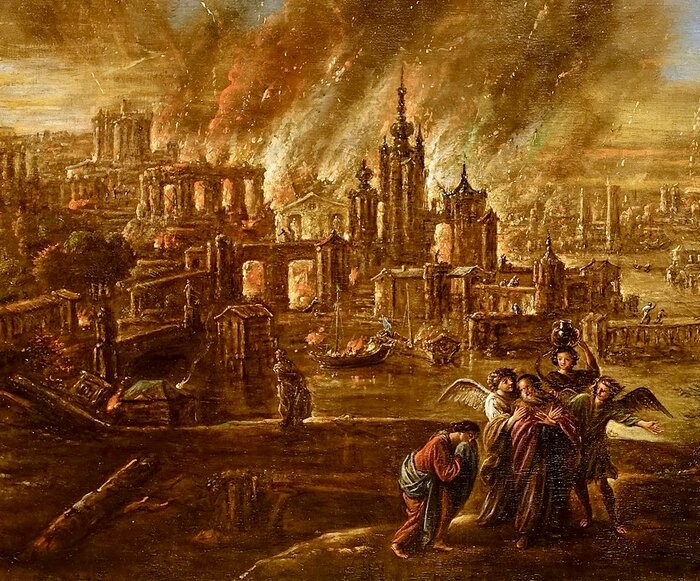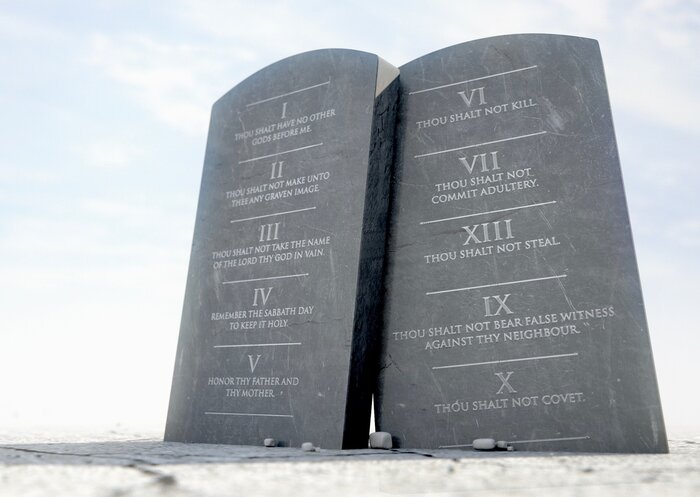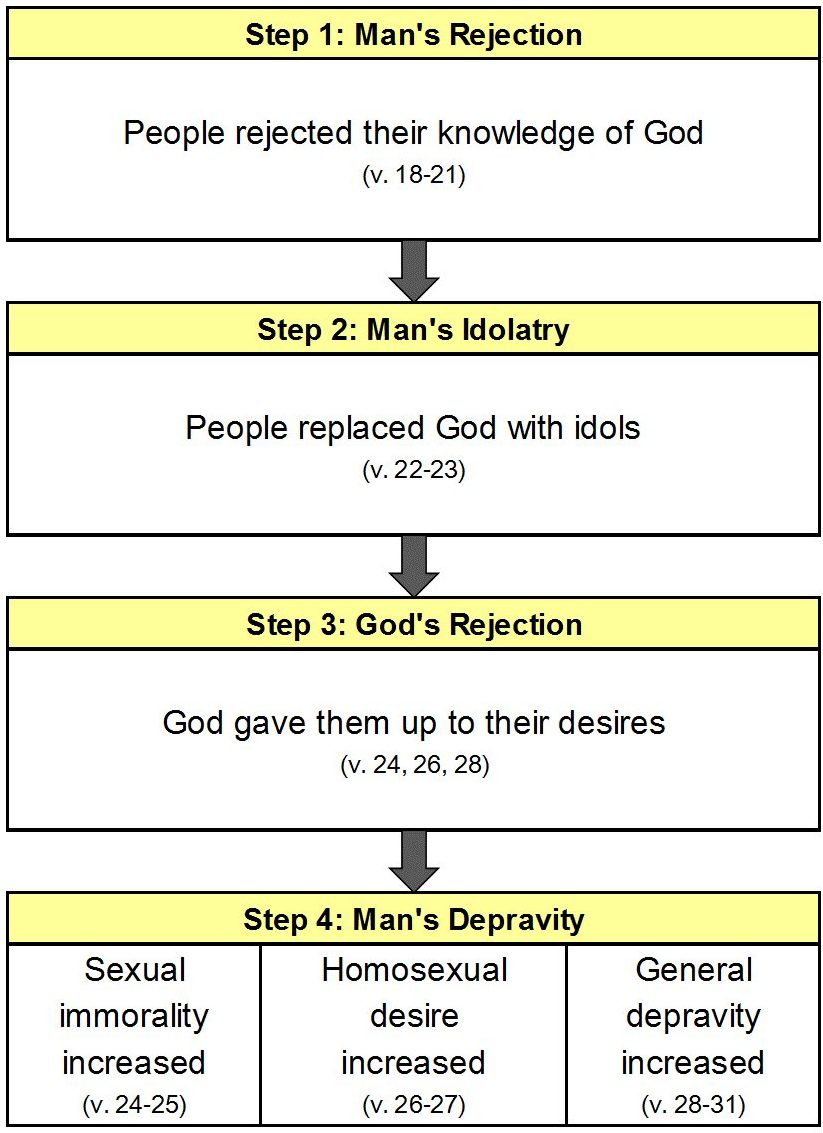 I’ve avoided writing this one for quite some time.
I’ve avoided writing this one for quite some time.
Homosexuality is just one of those touchy subjects many Christians like myself don’t like to address.
Sure, you can label our hesitance here as simple cowardice, but the reality is that this topic often puts us in lose-lose situations.
If we stick to sound biblical convictions, we’re condemned as bigots who don’t love like Jesus did. And if we compromise our beliefs for the world’s acceptance, we prove that our claimed allegiance to God was nothing more than a sham.
Well, today I’ve chosen to be a loser.
I’ve chosen to be a loser who tells the truth.
Now don’t get me wrong, I’m not writing this out of hate, bigotry, or some immature desire for drama though. I’m writing this from a place of compassion.
The reason I chose to write this now is because I’ve gotten legitimate questions from homosexuals, and as a teacher of God’s Word, it’s my job to address those questions with legitimate biblical answers.
Contrary to what some people think, Scripture doesn’t say “gay people bad” and leave it at that. The Bible’s real message puts that straw man to shame.
So instead of relying on hearsay and personal opinions, I’ll work through multiple Bible passages on this topic, and explain how most people miss the forest for the trees when they teach it.
(Note: Today’s topic requires me to cover some mature and uncomfortable texts in Scripture. I’ll still present everything here in a tasteful way like normal, but it is worth giving a heads up.)
Homosexual Desire in Biblical History
First, we need to take a trip through biblical history—particularly through the Old Testament.
Homosexual desire is nothing new. In fact, the first book of the Bible details the most infamous account of it.
On Sodom and Gomorrah

We first hear about the state of Sodom and Gomorrah in Genesis chapter 13. To add some context to this passage though, the chapter tells how Abram—whose name was changed later to Abraham—decided that he and his nephew, Lot, should separate since their shared land couldn’t support both men’s possessions (Gen. 13:8-9). The two agreed to the separation and Abram gave Lot first choice of where to go.
Lot saw that the Jordan Valley and its surrounding cities looked the most promising, so he traveled there and “moved his tent as far as Sodom” (Gen. 13:10-12 ESV). We’re then immediately told in verse 13 that “the men of Sodom were wicked, great sinners against the Lord.” (Gen. 13:13 ESV)
A few chapters later, the cities are brought up again—this time in conversation between Abraham and God:
Then the Lord said, “Because the outcry against Sodom and Gomorrah is great and their sin is very grave, I will go down to see whether they have done altogether according to the outcry that has come to me. And if not, I will know.” (Gen. 18:20-21 ESV)
The implication here is that God would judge Sodom and Gomorrah for their wickedness if they were found guilty. And even though God granted Abraham’s request to spare Sodom if only ten righteous people were found (Gen. 18:32), the city still wouldn’t pass the test.
God sent two angels disguised as men into the city later, and chapter 19 tells what happened next:
The two angels came to Sodom in the evening, and Lot was sitting in the gate of Sodom. When Lot saw them, he rose to meet them and bowed himself with his face to the earth and said, “My lords, please turn aside to your servant’s house and spend the night and wash your feet. Then you may rise up early and go on your way.” They said, “No; we will spend the night in the town square.” But he pressed them strongly; so they turned aside to him and entered his house. And he made them a feast and baked unleavened bread, and they ate.
But before they lay down, the men of the city, the men of Sodom, both young and old, all the people to the last man, surrounded the house. And they called to Lot, “Where are the men who came to you tonight? Bring them out to us, that we may know them.” Lot went out to the men at the entrance, shut the door after him, and said, “I beg you, my brothers, do not act so wickedly. Behold, I have two daughters who have not known any man. Let me bring them out to you, and do to them as you please. Only do nothing to these men, for they have come under the shelter of my roof.” But they said, “Stand back!” And they said, “This fellow came to sojourn, and he has become the judge! Now we will deal worse with you than with them.” Then they pressed hard against the man Lot, and drew near to break the door down. But the men reached out their hands and brought Lot into the house with them and shut the door. And they struck with blindness the men who were at the entrance of the house, both small and great, so that they wore themselves out groping for the door. (Gen. 19:1-11 ESV)
As the angels entered the city intending to stay in the town square, Lot “pressed them strongly” to reconsider and stay at his house—most likely because he knew the square wouldn’t be safe.
We then see that Lot’s fear was warranted as “the men of Sodom, both young and old, all the people to the last man” surrounded Lot’s house and demanded he bring the visitors out so the group could “know them” (i.e. have sexual relations with them).
Lot knew that would be a heinous act, so he offered the seemingly less wicked option of giving his virgin daughters to the mob instead. The group refused the compromise, though, and tried to force their way in. But fortunately, the angels pulled Lot back in the house and blinded the men near the entrance.
Later verses of chapter 19 describe how the angels helped Lot and his obedient family members escape Sodom’s destruction. Then we’re told what Abraham saw when he looked towards the city the next morning:
And Abraham went early in the morning to the place where he had stood before the Lord. And he looked down toward Sodom and Gomorrah and toward all the land of the valley, and he looked and, behold, the smoke of the land went up like the smoke of a furnace.
So it was that, when God destroyed the cities of the valley, God remembered Abraham and sent Lot out of the midst of the overthrow when he overthrew the cities in which Lot had lived. (Gen. 19:27-29 ESV)
So why were Sodom and Gomorrah destroyed?
The simple answer is because of their wickedness.
A lot of people think and teach that God destroyed Sodom because of the visiting angels account, but that event only confirmed the people’s depravity as described in Genesis 13:13 and Genesis 18:20.
The Bible does, however, count their homosexual desire as part of that depravity.
Later in the New Testament, Jude condemned how the cities had “given themselves over to sexual immorality and gone after strange flesh” (i.e. unnatural sexual relations) (Jude 7). And Peter, like Jude, explained how the cities served as examples of those God would punish in the future (2 Pet. 2:6 ESV).
The Mosaic Law Restrictions

After the Sodom and Gomorrah account, the next reference to homosexual activity is found in Leviticus chapter 18.
The book of Leviticus covers many rules and regulations given to Israel through Moses after God miraculously led the Israelites out of slavery. These commands were part of a larger set of instructions called the Mosaic Law.
Now before we get to the rules about homosexual activity, we need to understand the purpose of these laws. There are plenty of misconceptions about the Mosaic Law and its relevance today, but the following passage at the start of chapter 18 gives insight into why it was given:
And the Lord spoke to Moses, saying, “Speak to the people of Israel and say to them, I am the Lord your God. You shall not do as they do in the land of Egypt, where you lived, and you shall not do as they do in the land of Canaan, to which I am bringing you. You shall not walk in their statutes. You shall follow my rules and keep my statutes and walk in them. I am the Lord your God. You shall therefore keep my statutes and my rules; if a person does them, he shall live by them: I am the Lord. (Lev. 18:1-5 ESV)
God wanted Israel’s conduct to reflect their status as His people. So the Law was given to prevent Israel from behaving like the nations surrounding their land. Sodom and Gomorrah were a perfect example of what God didn’t want Israel to become, and this is one reason why we see the following restriction in verse 22:
You shall not lie with a male as with a woman; it is an abomination. (Lev. 18:22 ESV)
Leviticus chapter 20 likewise condemns homosexual activity, and it includes it among other forms of sexual immorality that were capital offenses under the Mosaic Law:
“If a man commits adultery with the wife of his neighbor, both the adulterer and the adulteress shall surely be put to death. If a man lies with his father’s wife, he has uncovered his father’s nakedness; both of them shall surely be put to death; their blood is upon them. If a man lies with his daughter-in-law, both of them shall surely be put to death; they have committed perversion; their blood is upon them. If a man lies with a male as with a woman, both of them have committed an abomination; they shall surely be put to death; their blood is upon them. If a man takes a woman and her mother also, it is depravity; he and they shall be burned with fire, that there may be no depravity among you. If a man lies with an animal, he shall surely be put to death, and you shall kill the animal. If a woman approaches any animal and lies with it, you shall kill the woman and the animal; they shall surely be put to death; their blood is upon them (Lev. 20:10-16 ESV, emphasis added).
As you can see, the punishment for sexual sin was severe, but it was enacted so “there may be no depravity among [Israel]”.
Now before I go on, I need to address two concerns about these passages.
First, I’ll stress that these laws were given to ancient Israel. While the Mosaic Law expresses God’s character and defines moral behavior that is still relevant, the specific punishments, ceremonial guidelines, and amoral instructions do not apply to us today. Anyone who uses these verses in support of violence or mistreatment of homosexuals is mishandling the text.
Next, it’s common for people with fancy degrees to argue that these verses don’t actually condemn homosexuality. The argument usually involves linguistic gymnastics to prove that the original Hebrew refers to an entirely different act like incest or cult prostitution.
This argument holds no weight at all.
For one, there are already commands against incest and the ritual prostitution surrounding nations practiced (Lev. 18:6-8, Deut. 23:17). If these verses were about those sins, the Hebrew would more specifically refer to them like it does in the two previously cited verses.
Second, when viewed within the totality of Scripture—like we’re doing here—these commandments align with the Bible’s holistic teaching about homosexual behavior. We’ll learn more about that later, and I’ll even explain why the meaning of these verses is so contested, but my answers here should suffice for now.
Israel, or Sodom?

So we saw what happened with Sodom and Gomorrah, and we just looked at the Mosaic Law restrictions.
Well surely Israel with all that knowledge of God and His commands would be just fine going forward, right?
No, not at all.
Much of the remaining Old Testament shows Israel’s spiritual decline throughout history. And Judges is one of the Old Testament books that focuses on this decline.
The period Judges describes is especially sad though because it began within a few generations of Israel receiving the Mosaic Law. The book shows how the nation went through times of disobedience, idolatry, defeat, repentance, deliverance, and then peace, only to restart the cycle multiple times.
One particularly disturbing scene stands out in the book’s conclusion though.
Judges 19 tells the story of an unnamed Levite and his concubine. The first verses show the Levite traveling with his servant and donkeys to bring back the concubine who had been unfaithful to him.
After meeting at her father’s house, the Levite, his servant, and the woman eventually left to return home, but stopped in the town of Gibeah for the night. (Gibeah was a town that belonged to the Israelite tribe of Benjamin at the time.)
As they sat in the town square waiting, they eventually met an old man who was sojourning in the area. The Levite then told the old man of their situation, which led to the following scene:
And the old man said, “Peace be to you; I will care for all your wants. Only, do not spend the night in the square.” So he brought him into his house and gave the donkeys feed. And they washed their feet, and ate and drank.
As they were making their hearts merry, behold, the men of the city, worthless fellows, surrounded the house, beating on the door. And they said to the old man, the master of the house, “Bring out the man who came into your house, that we may know him.” And the man, the master of the house, went out to them and said to them, “No, my brothers, do not act so wickedly; since this man has come into my house, do not do this vile thing. Behold, here are my virgin daughter and his concubine. Let me bring them out now. Violate them and do with them what seems good to you, but against this man do not do this outrageous thing.” But the men would not listen to him. So the man seized his concubine and made her go out to them. And they knew her and abused her all night until the morning. And as the dawn began to break, they let her go. And as morning appeared, the woman came and fell down at the door of the man’s house where her master was, until it was light. (Judges 19:20-26 ESV)
This scene is a mirror image of the Sodom and Gomorrah account, only this time, there were no angels to prevent the sexual abuse.
Now, believe it or not, this story gets even more horrific later on, and subsequent actions actually led Israel to its first civil war. But if we just focus on this part of the story, it’s shocking that a scene like this would ever occur in Israel. No, we don’t have reason to believe all the city’s men were depraved as was the case in Sodom, but we still see evidence of homosexual desire and sexual immorality.
The Old Testament is full of these “show, don’t tell” moments that depict how Israel broke the Mosaic Law and became just like their neighbors.
Sure, things temporarily improved after the tribes united into a kingdom under godly leadership, but later disobedience led to further decline (see Hosea 9:9). Sinful actions caused the united kingdom to eventually split into the northern section called Israel, and the southern section called Judah.
Between the two nations, Judah had more periods of obedience, but as the following passage in Second Kings tells us, neither kingdom did well in the long run:
Yet the Lord warned Israel and Judah by every prophet and every seer, saying, “Turn from your evil ways and keep my commandments and my statutes, in accordance with all the Law that I commanded your fathers, and that I sent to you by my servants the prophets.”
But they would not listen, but were stubborn, as their fathers had been, who did not believe in the Lord their God. They despised his statutes and his covenant that he made with their fathers and the warnings that he gave them. They went after false idols and became false, and they followed the nations that were around them, concerning whom the Lord had commanded them that they should not do like them. (2 Kings 17:13-15 ESV)
Later, we even see the Israelites compared to Sodom and Gomorrah in the books of Isaiah, Jeremiah, and Ezekiel—sometimes by God Himself (Isaiah 1:9-10, Isaiah 3:8-9, Jer. 23:14, Ezek. 16:47-50).
So while homosexual desire isn’t explicitly shown among the Israelites after Judges, the rampant idolatry, the comparisons to Sodom, and the general increase in depravity leave little reason to believe it wasn’t present.
Either way though, all this sinfulness eventually led to God’s judgment.
The northern kingdom of Israel was defeated and its people were exiled by the Assyrians in 722 BC. The southern kingdom of Judah lasted longer but eventually fell, and its people were exiled by the Babylonians in 586 BC (see 2 Kings 17:18-20).
Homosexuality and The Pattern of Sinfulness
 So why did we do this whole exercise? Why did we go through so much Old Testament history when all you wanted to know was whether homosexuality was a sin?
So why did we do this whole exercise? Why did we go through so much Old Testament history when all you wanted to know was whether homosexuality was a sin?
Because I’m building to something here.
Remember how I said most people miss the forest for the trees when they cover this topic? Well, the book of Romans shows us that forest with a birds-eye view—it’s just tough to fully grasp it if you don’t know history.
We reviewed that stuff already though, so now we can dive into chapter 1.
The back end of Romans chapter 1 describes what I call “The Pattern of Sinfulness”. (I’m sure there’s an official theology term for it, but that’s what I’ll call it here.)
In the passage, the Apostle Paul explains how God’s wrath is revealed against wicked people throughout history, and this pattern takes shape over the following four steps:
- Man’s Rejection
- Man’s Idolatry
- God’s Rejection
- Man’s Depravity
Step 1: Man’s Rejection
Paul begins his explanation in verses 18 through 20 below:
For the wrath of God is revealed from heaven against all ungodliness and unrighteousness of men, who by their unrighteousness suppress the truth. For what can be known about God is plain to them, because God has shown it to them. For his invisible attributes, namely, his eternal power and divine nature, have been clearly perceived, ever since the creation of the world, in the things that have been made. So they are without excuse. (Rom. 1:18-20 ESV)
Here, Paul says that God’s wrath is a consequence facing wicked people who “by their unrighteousness suppress the truth”. Paul states that these people have no excuse for what’s happening though, because God has revealed evidence of His existence and power in numerous ways—specifically through all of creation.
Instead of using that knowledge to seek God and obey Him, however, verse 21 says:
For although they knew God, they did not honor him as God or give thanks to him, but they became futile in their thinking, and their foolish hearts were darkened” (Rom 1:21 ESV).
These people rejected the truth revealed to them, and because of this, they regressed to a darker state.
Step 2: Man’s Idolatry
After these people rejected God, they needed to replace Him. Verses 22 and 23 tell us how they did it:
Claiming to be wise, they became fools, and exchanged the glory of the immortal God for images resembling mortal man and birds and animals and creeping things. (Rom. 1:22-23 ESV)
They made statues and images of all kinds of creatures to worship instead of God. “[T]hey exchanged the truth about God for a lie and worshiped and served the creature rather than the Creator” (Rom. 1:25 ESV). And this led to a response from God.
Step 3: God’s Rejection
These people rejected God, so He returned the favor.
We’re told three times in the the next nine verses that God “gave them up”. He abandoned them and allowed their desires to enslave them in three different ways:
- “God gave them up in the lusts of their hearts to impurity” (Rom. 1:24 ESV)
- “God gave them up to dishonorable passions” (Rom. 1:26 ESV)
- “God gave them up to a debased mind” (Rom. 1:28 ESV)
God’s restriction of sin was removed, and the results that followed weren’t pretty.
Step 4: Man’s Depravity
Here we see the results of man’s rejection and God’s abandonment.
First, there’s an increase in sexual immorality:
Therefore God gave them up in the lusts of their hearts to impurity, to the dishonoring of their bodies among themselves, because they exchanged the truth about God for a lie and worshiped and served the creature rather than the Creator, who is blessed forever! Amen. (Rom. 1:24-25 ESV)
Next, an increase in homosexual desire:
For this reason God gave them up to dishonorable passions. For their women exchanged natural relations for those that are contrary to nature; and the men likewise gave up natural relations with women and were consumed with passion for one another, men committing shameless acts with men and receiving in themselves the due penalty for their error. (Rom. 1:26-27 ESV)
And lastly, an increase in general depravity:
And since they did not see fit to acknowledge God, God gave them up to a debased mind to do what ought not to be done. They were filled with all manner of unrighteousness, evil, covetousness, malice. They are full of envy, murder, strife, deceit, maliciousness. They are gossips, slanderers, haters of God, insolent, haughty, boastful, inventors of evil, disobedient to parents, foolish, faithless, heartless, ruthless. Though they know God’s righteous decree that those who practice such things deserve to die, they not only do them but give approval to those who practice them. (Rom. 1:28-32 ESV)
These people’s seemingly harmless rejection of God led to a drastic change in society.
This is The Pattern of Sinfulness Paul described in Romans chapter 1. To summarize, I’ve outlined each step of the pattern below:

The Heart of the Matter
Now that we’ve had our history lesson and I’ve finished explaining The Pattern of Sinfulness, I’m sure you’ve made a few connections.
The first being that Sodom and Gomorrah were an example of a society that reached the final step in the pattern, and the second being that Israel—even with its great knowledge of God and the Mosaic Law—still fell into a similar pattern (see Psalm 81:11-12).
If you’re especially “woke” though, you’ve also realized that this pattern still occurs today.
Now granted, most of us aren’t worshiping golden calves anymore, but idolatry takes many forms. Idols aren’t always statues or images; popular ones today include money, yourself, or even a false idea of God. Anything that replaces the true and living God in your life is an idol. And when you think about it this way, the similarities become even more apparent.
Just like civilizations of old, many of us have rejected God, replaced Him with idols, and are now witnessing the consequences of our actions.
So why does this keep happening? Why did nations throughout history become depraved? Why did Israel, with all its spiritual advantages, still follow the same pattern?
The answer is the same reason why homosexuals say, “God made me like this.”
A lot of Christians get flustered when they hear that expression, but I actually like when people say it because it points us all to the heart of the matter.
When people say things like “God made me gay” or “I was born this way”, they are admitting that there is something inside them—in their very nature—that causes them to act the way they do. And what does that sound like to keen Bible students everywhere?
It sounds like original sin.
The doctrine of original sin is the belief that all of humanity has an inherent inclination to sin due to Adam’s choice in the Garden of Eden. The doctrine states that we don’t simply choose to sin against God and His commandments; we sin because we are sinners by nature (see John 8:34).
Now yes, there are varying beliefs about this doctrine. Some Christians think it’s true and others believe it’s a myth. But guess what? It doesn’t matter what we think, because the Bible clearly teaches it.
In Romans chapter 3, Paul affirms the universal sinfulness of humanity saying:
What then? Are we better than they? Not at all. For we have previously charged both Jews and Greeks that they are all under sin.
As it is written:
“There is none righteous, no, not one;
There is none who understands;
There is none who seeks after God. (Rom. 3:9-12 ESV)
He then explains the origin of our condition in chapter 5:
Therefore, just as sin came into the world through one man [Adam], and death through sin, and so death spread to all men because all sinned (Rom. 5:12 ESV)
Later, Paul also writes that “one trespass led to condemnation for all men” and “by the one man’s disobedience the many were made sinners” (Rom. 5:18-19 ESV).
This contradicts the Pelagian view of sin that’s so popular today. In our eyes, people are inherently good and our wills aren’t predisposed to any choice. If we make “mistakes” or turn out to be criminals, it’s only because of our past, our upbringing, or our environment. But this isn’t what Scripture teaches.
Jesus Himself said our hearts are the cause of our behavior (Matt. 15:18-19). And our sinful hearts were passed down by the very first human when we were conceived (see Psalm 51:5).
So no, God didn’t make people gay or any other type of sinner. It’s more appropriate to say that Adam did.
Our condition prevents us from perfectly obeying God’s commands. In fact, it makes us hostile to them (Rom. 8:7-8 NASB). Those commands rile up the dormant desires and rebellious nature within us (see Rom. 7:7-9 NIV, Rom. 7:13 NIV). That’s why people argue so hard against the clear teaching of Scripture.
God’s perfect standard makes us feel inadequate, frustrated, and guilty. It throws our imperfections in our face and calls them out for what they are. And this is why Paul says, “through the law comes knowledge of sin” (Rom. 3:20 ESV).
So what do homosexuals and all us other sinners do with this knowledge? Do we remove all restriction and embrace our nature like the world tells us to? Do we condemn ourselves even further with strict observance of the Mosaic Law?
No.
The Bible points us all to a better solution.
Reversing the Pattern: From Bad News to Good News
 Now it’s finally time for hope.
Now it’s finally time for hope.
False religions and trendy social movements propose countless actions to address our condition, yet the Bible’s answer isn’t so much about what we do, but rather, who we know (Rom. 4:5).
Paul writes in Romans chapter 8 saying:
For God has done what the law, weakened by the flesh, could not do. By sending his own Son in the likeness of sinful flesh and for sin, he condemned sin in the flesh, in order that the righteous requirement of the law might be fulfilled in us, who walk not according to the flesh but according to the Spirit. (Rom. 8:3-4 ESV)
Instead of weighing us down with more laws, God sent the sinless Jesus to fulfill His requirements and yet suffer as a sinner so all who believe on Him can walk in newness of life (see Rom 6:4, 2 Cor. 5:21).
Believers in Christ’s work have their hearts changed by God’s Holy Spirit (Titus 3:5 NASB), and this transformation frees us from slavery to our old nature (Rom. 6:6).
Sure, Christians are still stuck in bodies corrupted by sin, but they have the power and the desire to master it. Our wills are freed to either obey God or our sinful desires. Yet Paul tells us what to choose in Romans chapter 6:
Let not sin therefore reign in your mortal body, to make you obey its passions. Do not present your members to sin as instruments for unrighteousness, but present yourselves to God as those who have been brought from death to life, and your members to God as instruments for righteousness. (Rom. 6:12-13 ESV)
That’s what I’ve tried to do for more than twenty years as a Christian. I admit I still have urges to do what I shouldn’t. I get angry, I lie, and I still fight lustful thoughts. But such is the reality of the Christian life (see Rom. 7:15-21 NIV).
Believing on Jesus doesn’t make you perfect, but it does allow you to strive towards His sinless perfection.
Without Christ, none of us would stand a chance. We’d all be the sexually immoral idolaters, adulterers, and homosexuals Scripture condemns (1 Cor. 6:9-10). But that’s why I love what the Bible says right after condemning those people:
“And such were some of you.” (1 Cor. 6:11)
Homosexuality or any other sinful behavior is not immutable. Some of the world’s very first Christians were proof of that.
They had the same desires, the same lifestyles, and the same lies told to them before. But that all changed when they heard the truth.
That’s why I finally wrote this article: I wanted you to hear the truth too (John 8:32).
Jesus offers all of us freedom from our condition. And that my friend, will always be good news.
Let’s Speak the Truth in Love

You know that feeling when you finally get something important off your chest?
That’s what I’m feeling right now.
While the world ironically labels homosexual acceptance as “progress”, Scripture describes it as one of the most recognizable signs of regression. So it’s crucial for me to make that known.
But please understand that when Christians like me denounce LGBT causes, we are not expressing hate towards people (or at least we shouldn’t be). We are expressing hate towards a system that says it is good to embrace your sin nature (see Eph. 6:12 NIV).
That’s what this is all about.
Good theology clears up misconceptions like this and the resulting confusion. So let’s keep studying, keep learning, and remember to speak the truth in love.
-Drew
Photo Credits (By Order of Appearance):
- Priscilla Du Preez on Unsplash
- Sodom and Gomorrah Afire from Public Domain
- Inked Pixels on Shutterstock
- Sorin Popa on Shutterstock
- Alexander Michl on Unsplash
- Geralt on Pixabay
- Jantanee Runpranomkom on Shutterstock
Brilliant piece.
It’s so captivating that God demonstrated his role as the persistent lover like in the story of Hosea and his concubine wife. It paints such a vivid picture of how we are the wretched harlot by nature, yet such a Holy God would still want us as His One – the greatest Romance there is. I love how after reading this post, I feel like I’ve just read and seen a dystopic world that’s finally seeing hope. The opening of Genesis recounts a happy, innocent, and childlike state of humans, and reading Judges was such a graphic scene for me. As I read towards the end, just as you felt like you got something important off your chest Drew, I felt I could finally breathe a sigh of relief and have something to look forward to in this world – the Hope of Jesus Christ. Every day all of us are playing and weaving into the fibres of this ongoing story of Reality, and although the sobering reality is that many will go down the broad path and suffer a tragic ending….us Christians are called not to hoard and judge with what we have learnt from the Scriptures. We need to snatch souls from the eternal fire.
Thanks Joy. I really appreciate it.
It’s interesting that you mentioned Hosea’s marriage here because I couldn’t stop thinking about all the illustrations God used through the prophets while writing this. Some of the actions Ezekiel did were troubling from a human viewpoint too for example, but when we understand what those actions portrayed, it’s a great reminder of how important God’s grace really is.
As for the rest of your comment, I don’t think I could have said it better myself. The Bible’s message isn’t always a happy one like you said, but Scripture truly is the one place we can find hope. So it’s our duty to spread that good news.
I like the way you’ve directed this article. I’m a Muslim and contrary to contemporary misconceptions Muslims hold Jesus very dear.
The downfall of society is inevitable, the light of guidance can only be lit up by Allah himself. Humans can only try. The direction of modern society is no different than the collective sinful yearnings of earlier civilizations. Currently mankind is worshipping fame, money, social status, career, family, football clubs etc etc. The removal of God from social systems and beliefs has evolved these petty desires into idols of worship.
The sheep are moving into the lair of the wolves. Tough times ahead. May Allah guide and protect us
Thank you. I structured this one so that it would be easy to see patterns and themes throughout, so I’m glad you liked it.
But yes, the Bible doesn’t sugarcoat history and it constantly uses examples to urge us not to repeat those actions despite our inclinations. The greater message, however, is that these current problems are nothing compared to the life changing work of Christ and His Spirit. And someday, believers won’t have to worry about this stuff at all.